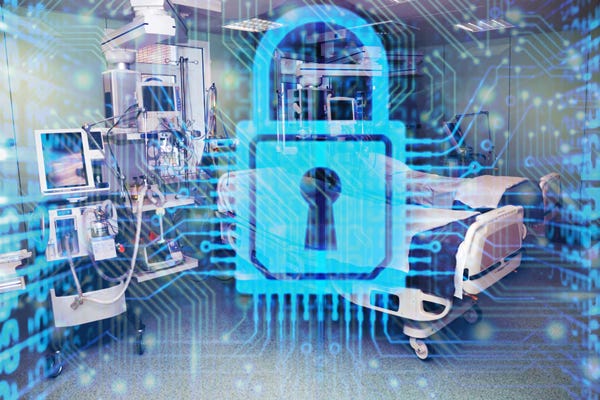
How Safe Is Healthcare Technology ?
How Safe Is Healthcare Technology From Hackers?

Healthcare
technology is evolving more and more each day, with blockchain,
telemedicine and 3D printers being used by medical professionals around
the country. But one question still remains to be answered: Can this
technology be hacked into? If so, that could mean dangerous consequences
for medical records, and sensitive information could be compromised.
Throughout this article, we’ll examine how security can potentially be
threatened by this technology and give tips on how organizations can
ensure their information is secure.
Can 3D Printers Be Hacked?
While 3D printing can sometimes take several hours
and be extremely difficult when designing products, this hasn’t stopped
industries from utilizing it to the best of its abilities. Several
companies such as Adidas and GE are using 3D printing to advance production and manufacturing. Using digital files, 3D printers can produce a plethora of three-dimensional solid objects.
Hospitals are taking advantage of this technology to make historic strides in the healthcare industry. 3D printing is creating innovations in the field of radiology,
a science helping to diagnose and treat diseases using medical imaging
technology. According to the University of Cincinnati, “3D printing is
just now come into style across the radiology realm, as professionals
can leverage it for educational, research and other purposes.
But are 3D printers completely safe from hackers? As Harvard Business Review points out,
closed systems have dominated the 3D printing industry within the last
10 years. This means 3D printers can only be accessed with the
manufacturer’s resin and software. But several companies are shifting to
a more open system, which allows for many advantages but also threatens
security. “Once introduced into an open environment, a virus can spread
faster through multiple parties and flows of information than in a
closed system,” Harvard Business Review said.
Hackers
often target individuals through shutting down servers, corrupting data
and breaking into computer databases, but 3D printing takes the
possibilities of hacking to new and frightening levels. By corrupting a
3D printer file, hackers can cause product failures and trigger
injuries, product recalls and litigations. Researchers across the
country are now figuring out ways to combat these cyberattacks and one
method of prevention could be as simple as listening to what sounds the 3D printer makes.
Can Blockchain Be Hacked?
Blockchain,
which helps keep track of transactions within machines, is already
being used by a variety of different industries in groundbreaking ways.
From insurance agencies to record companies, blockchain technology is
revolutionizing the way industries store and track data. Medical
professionals are able to manage data and conduct research more
effectively by using blockchain technology. There is even blockchain
technology with the ability to track the degree of cleanliness in hospitals by monitoring hand hygiene.
With
blockchain networks being used by so many different organizations
around the world, do we know whether or not it’s safe from hackers?
Blockchain technology is indeed vulnerable to hackers, and there are many avenues
within these systems where hackers can strike. Users of blockchain
networks are given private keys, which are used to sign account
transactions, and if hackers receive access to it, they could
potentially steal information and corrupt data. The security of a
blockchain platform can be compromised through software errors as well,
which occur during the development of software implementation.
Blockchain
technology is as susceptible to hackers as any other systems and users
need to have the skills necessary to protect themselves from
cyber-attacks. There are several apps
that can help prevent cyber-attacks in blockchain networks such as
Civic, which prevents identities from being stolen, and Biometrics.io,
which uses face recognition technology to identify users. Using these
tools, companies can keep their networks secure and ensure their data is
safe against hackers.
Can Telemedicine Be Hacked?
Telemedicine is becoming more and more prevalent in the medical field, and it’s benefiting citizens from rural communities greatly. There are now even at-home diagnostic tools
available such as electrocardiogram ECG devices, which can keep track
of heart health and detect when a heart attack is taking place. There
are several smartphone apps helping to advance the possibilities of
telemedicine such as the recently announced
MinuteClinic service by CVS, which allows users to be diagnosed and
treated by doctors through a video conversation on their smartphone.
Even
though this technology is helping more communities find medical care
and providing an easier form of treatment and diagnosis, is it really as
safe from hackers as we may think? While telemedicine is considered
safer than many other forms of healthcare technology, hackers can still
use several types of ransomware to keep the operation of a medical
device hostage and steal data.
Ransomware
is a technique used by hackers to extract payment or information, in
which a target’s computer is locked until the hacker’s demands are met.
Ransomware is usually performed through encryption tactics, and hackers
typically order to be paid in a form of online currency such as bitcoin.
These type of cyberattacks are at an all-time high, and it’s important to know what to do when you’re targeted.
To
avoid privacy and security issues, telemedicine networks are required
to comply with the HIPAA, which stands for the Health Insurance
Portability and Accountability Act. This act helped to make medical
records private and keep health information from getting in the hands of
hackers. Telemedicine technology is required to abide by HIPAA’s
guidelines, which include implementing a system of secure communication,
allowing only authorized users to receive access to services and
putting safeguards in place to prevent accidental or malicious breaches.
By following these rules, telemedicine technology is more secure and
fewer cyber-attacks occur.
Source : hackernoon

